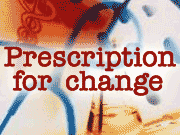 |
| President Bush delivered his state of the union message Tuesday night, and only briefly touched on the subject of health care reform. (Photo by Pablo Martinez Monsivais-Pool/Getty Images) |
St. Paul, Minn. — Bush has been a big advocate of health savings accounts, praising them as a tool for getting consumers to be more careful about their health care expenditures. Individuals who use the accounts tuck away money tax-free each month that can then be used to pay insurance deductibles.
Bush's remarks about health savings accounts were but a fragment of his State of the Union speech. And he gave no details about his proposals.
"We will strengthen health savings accounts, making sure individuals and small business employees can buy insurance with the same advantages that people working for big businesses now get," Bush said.
A White House press release, which amplifies the remarks, says those advantages have to do with tax breaks. University of Minnesota finance professor Steve Parente says what Bush is proposing is a way of levelling the playing field between employers and individuals who are paying for HSA insurance plans.
"There has been a tax deduction that employers have enjoyed in terms of providing health insurance, that doesn't exist in the individual market," Parente explains. "So you're paying full freight for the price, and that could be substantial difference. It could be as much as 20-30 percent difference in terms of price."
Parente says he's surprised Bush limited his remarks about health savings accounts to the fleeting reference to tax breaks, and to one line about increasing the ability to carry HSAs between jobs. Parente says those are some of the best health care market solutions available. But he was also surprised Bush didn't address the popularity HSAs are gaining nationally. Parente is himself leading a study that looks at the national sign-up rates for consumer driven health plans like health savings accounts.
"There are enough solid numbers out there to say that the take up rate for the HSAs is approaching two to three million people. He could easily have commented on that and that would've been a win, and basically said 'we want to extend this further to small businesses and entrepreneurs, the engines of growth for this economy,'" Parente explains.
"Really didn't help us much, did he? Other than say he's for it," says Chuck Gooder, an administrator with a medical clinic in Woodbury that employs about 40 people.
Gooder says he, too, was disappointed Bush didn't talk more about HSAs. He wanted to hear more about how small businesses like the clinic where he works could benefit from offering health savings accounts. He says his company has been considering them more and more, because the rising costs of health care are becoming too much of a burden on the company and its employees.
"Employees with a spouse and one to two children are paying somewhere in the neighborhood of $1,000 of premiums, and we cover $600," he says. "So that leaves them with a pretty substantial amount per month. These are employees that are making $16-$17 an hour."
Critics say health savings accounts won't actually bring costs down and that they end up being a good way for healthy people to set aside money for health care costs, but they're not a good deal for the chronically ill.
And John Miall, an employee benefits expert and consultant with the American Pharmacists Association says HSAs also lack another important feature: they're not easy to use. He says that issue could be significant to immigrants, who did figure prominently in Bush's speech.
"We have a huge non-English speaking workforce that he spoke about in his immigration statements. Those people barely speak the language, let alone, have the sophistication of the American financial system to invest those kinds of dollars."
Miall doubts HSAs are actually going to take off more dramatically in the next few years. And given the sparseness of Bush's comments about them last night, it's not clear how hard he'll push for that to happen.




